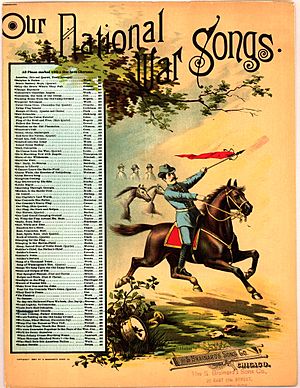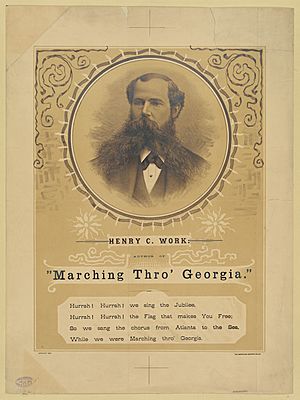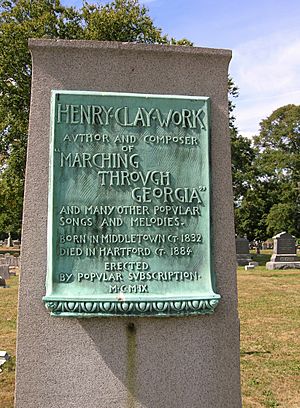Henry Clay Work facts for kids
Quick facts for kids
Henry Clay Work
|
|
|---|---|
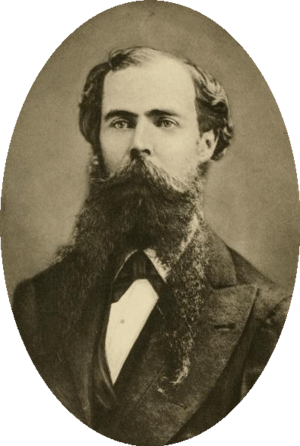 |
|
| Born | October 1, 1832 Middletown, Connecticut, U.S.
|
| Died | June 8, 1884 (aged 51) Hartford, Connecticut, U.S.
|
| Occupation |
|
| Spouse(s) | Sarah Parker Work |
| Children | 4 |
| Signature | |
Henry Clay Work (born October 1, 1832 – died June 8, 1884) was an American composer and songwriter. He is famous for writing popular songs like "Kingdom Coming", "Marching Through Georgia", "The Ship That Never Returned", and "My Grandfather's Clock".
Early Life and Learning
Henry Clay Work was born in Middletown, Connecticut. His parents were Alanson and Aurelia Work. His father was strongly against slavery, and Henry himself was an active supporter of ending slavery and helping the Union during the Civil War. Their family home was even a stop on the Underground Railroad. This was a secret network that helped enslaved people escape to freedom in Canada. Because of this, his father was once put in prison.
Henry learned music all by himself. He didn't go to a special music school. By the time he was 23, he worked as a printer in Chicago. His job was to arrange the special metal pieces used to print music. People said he would create songs in his mind while he worked. He didn't even need a piano, and the sounds of the printing machines helped inspire him! His very first song to be published was "We Are Coming, Sister Mary." This song later became a regular part of shows by a group called Christy's Minstrels.
Music Career
Henry Clay Work wrote many of his best songs during the American Civil War. His music truly captured the strong feelings people had during this time. He was even more popular than another famous songwriter, Stephen Foster. Henry Clay Work helped to develop the popular song structure we often hear today, where songs have a clear verse and chorus.
In 1862, he released "Kingdom Coming" with his own words. This song was so popular that it was used in a Broadway show called "Good Morning, Dearie" in 1921. You could also hear it in the background of the 1944 movie "Meet Me in St. Louis" starring Judy Garland. Also in 1862, he wrote a fun song called "Grafted Into the Army." The next year, 1863, he released "Babylon is Fallen," "The Song of a Thousand Years," and "God Save the Nation." His 1864 song "Wake Nicodemus" was also very popular in minstrel shows.
In 1865, Henry wrote his biggest hit, "Marching Through Georgia." He was inspired by General Sherman's famous march to the sea at the end of the previous year. This song had a very lively tune and became incredibly popular. Over a million copies of its sheet music were sold, which was a huge number back then! It's a cheerful marching song that has been used many times since, including by Princeton University as a football fight song.
Henry also wrote "Come Home, Father" in 1864.
After the Civil War, Henry wrote more sentimental songs. He had success with "The Lost Letter" and "The Ship That Never Returned." The tune from "The Ship That Never Returned" was even used later for other famous songs like "Wreck of the Old 97" and "MTA".
A huge hit for him was "My Grandfather's Clock," which came out in 1876. This song also sold over a million copies of its sheet music. It even made the phrase "grandfather clock" popular for describing a tall, old-fashioned clock.
Later Life and Legacy
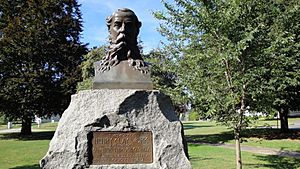
By 1880, Henry Clay Work was living in New York City and working as a musician. He passed away in Hartford two years later, at the age of 51. He was survived by his wife, Sarah Parker Work, and one of their four children.
Henry Clay Work's important contributions to music were recognized when he was added to the Songwriters Hall of Fame in 1970. He was also a distant cousin to Frances Work, who was a great-grandmother of Diana, Princess of Wales.
Famous Songs
Here are some of Henry Clay Work's most well-known songs out of his 75 compositions:
- "Kingdom Coming" (around 1863)
- "Come Home, Father" (1864)
- "Wake Nicodemus" (1864)
- "Marching Through Georgia" (1865)
- "The Ship That Never Returned" (1868)
- "Crossing the Grand Sierras" (1870)
- "My Grandfather's Clock" (1876)
 | Mary Eliza Mahoney |
 | Susie King Taylor |
 | Ida Gray |
 | Eliza Ann Grier |


